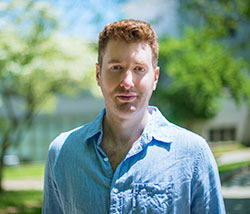Graduating from an Ivy League institution of higher education qualifies an individual as a scholastic elite. There’s a reason why Professor Noah Tsika exudes such intellectual confidence when instructing his students. His impact in the classroom is the result of a learner with a voracious appetite for studious achievement. Tsika is a media critic and historian.
With his standout deep-toned voice, he has contributed to several projects as a voice-over artist. His other accomplishments include being a journalist and editor, as well as, blogger for The Huffington Post and Africa Is a Country. His first book, Gods and Monsters, was published in 2009. Since then he has written Nollywood Stars: Media and Migration in West Africa and the Diaspora, Pink 2.0: Encoding Queer Cinema on the Internet, and Traumatic Imprints: Cinema, Military Psychiatry, and the Aftermath of War.
Tsika was an undergrad at Cornell University and Dartmouth College. He is known for beinga metacognitive strategist when it comes to his educational application, taking full advantage of the opportunity to excel scholastically, outlining his drive while studying at Dartmouth College.
“Socially, it was incred- ibly difficult,” he says. “I was a low-income, first- generation college student surrounded by the heirs to unimaginable fortunes, who treated me quite poorly, I’m afraid. I didn’t fit in. But after a while, I stopped trying to fit in, and I enjoyed the immense perks that came with an Ivy League education— including nightly screenings of classic films in the cavernous campus theater, and visits from such luminaries as Sean Penn, John Irving, Budd Schulberg, and Wendy Wasserstein. My professors were extraordinary, and I will always try to emulate them.”
Juggling time as a student and dealing with life’s difficulties can be challenging. He expressed that as a student, he found the “therapeutic value of reading and writing” which can be done anywhere.
“I came to see academic work not as a further burden but as a wonderful escape,” said Tsika.
Professionally, Film Studies has given Tsika the opportunity to travel the world. From Tsika’s perspective, “The study of film has, quite literally, taken me all around the world,” he said. “Realizing that cinema is not reducible to mainstream Hollywood is the first step; the next steps necessarily involve challenging oneself to discover alternatives to what seem like “natural” or “normal” filmmaking practices.
“When I first moved to Dakar, Senegal, I thought that I wanted to study activist documentaries produced and distributed locally. Suddenly, I found myself watching Nollywood melodramas in makeshift screening spaces overseen by public health organizations, and I was hooked. I wanted to know more about these 6-hour films that had come from Nigeria, and that were met in Senegal with considerable disdain—especially from those for whom “art” and “entertainment” are mutually exclusive categories, and who felt that Nollywood’s “trashy” videos were sullying African film culture.”
“I always try to impress upon my students that there are multiple, perhaps innumerable, and often contradictory definitions of “film” at work in the world today, that there is no one definition of the medium. Cinema is flexible, it’s porous. It involves more than just celluloid projections in a darkened theater. That’s what excites me most about the study of film, the challenge of locating and understanding alternatives to received wisdom about the medium’s “legitimate” contours.”
Tsika is committed to success in the classroom. He wants his students to leave with a genuine respect for the study of cinema and media, and a sense of the importance of film’s inter- sections with social and political history.
“I always teach film history with an emphasis on social justice advocacy, so I hope that my students leave with a willingness to consider questions of race, class, gender, nationality, and sexuality in relation to audiovisual media.”
When asked if he were stranded on a deserted island with an Apple TV and internet service, what one film would assist in keeping his sanity, “Robert Altman’s kaleidoscopic, tragicomic Nashville (1975), which is so inventive, so exuberant, so funny, and so moving that I can return to it again and again and discover some- thing new each time.”
With his numerous accomplishments, he said his greatest success is “Getting a full-time, tenure track position at Queens College.”














